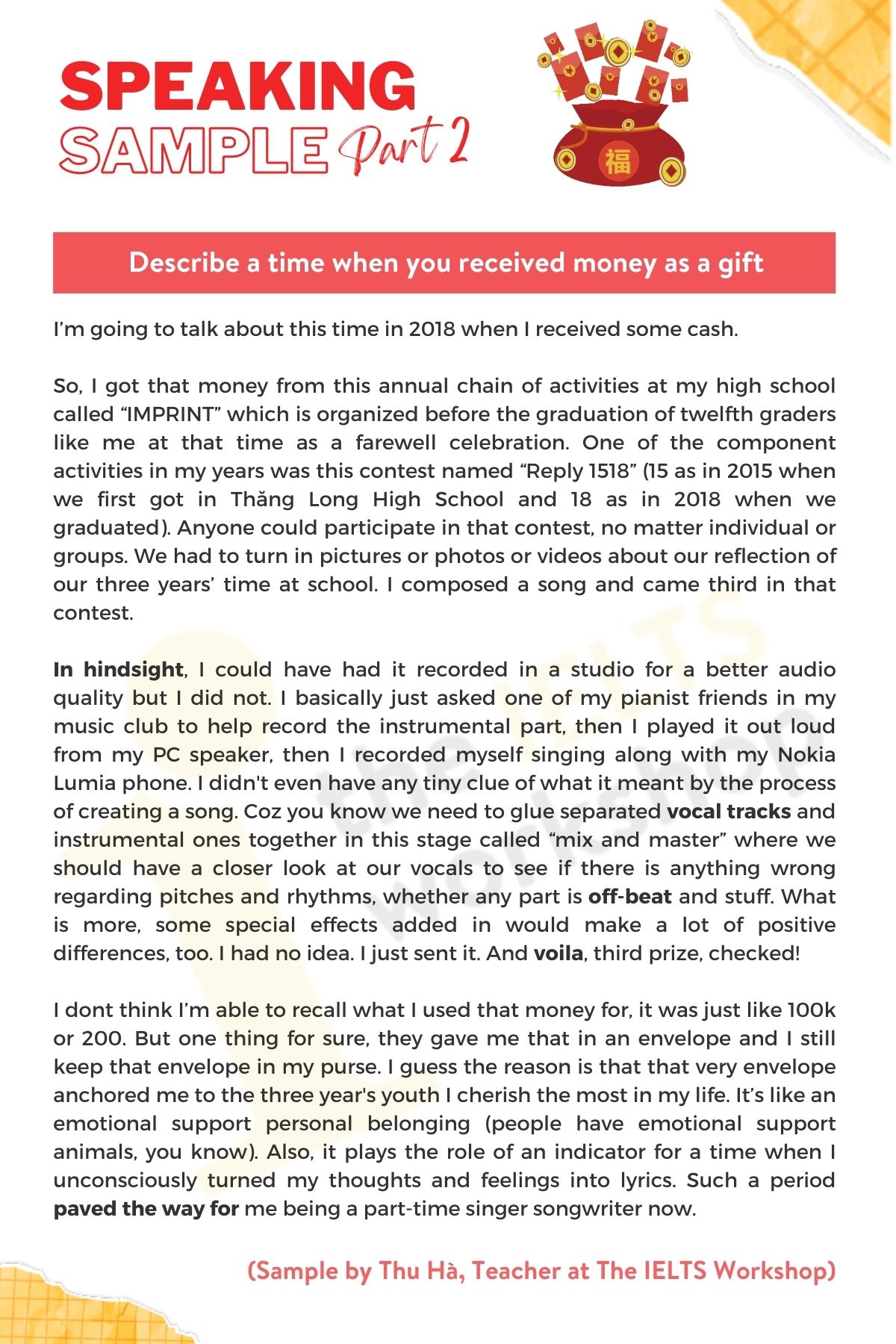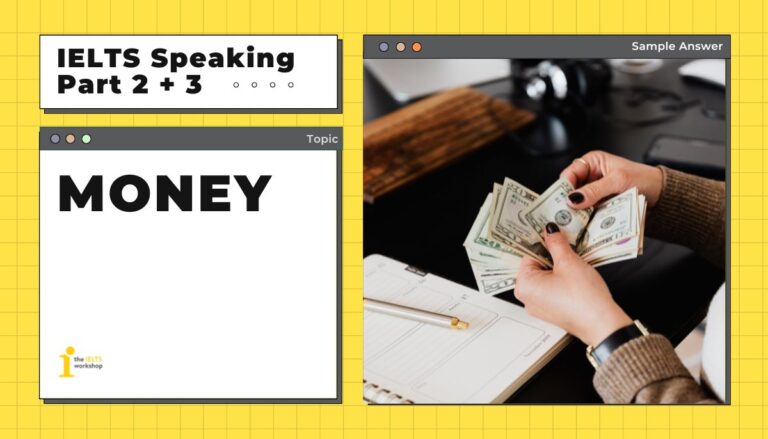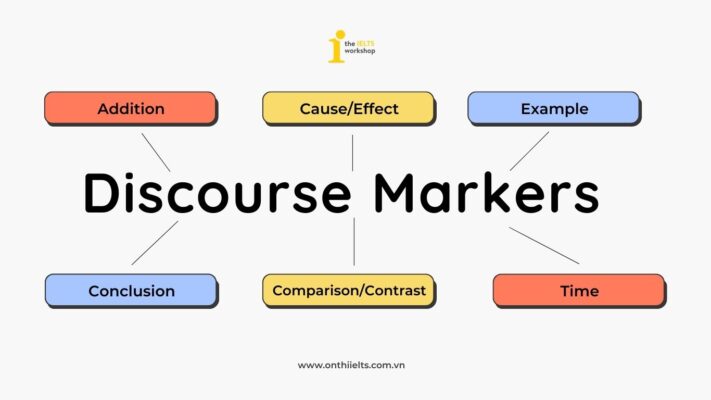Dưới đây là bài mẫu tham khảo cho chủ đề Describe a time when you received money as a gift trong IELTS Speaking Part 2 & 3 do cô Thu Hà của The IELTS Workshop gợi ý. Cùng tham khảo một vài cách diễn đạt ghi điểm trong phần thi IELTS Speaking nhé.
Part 2: Describe a time when you received money as a gift
Describe a time when you received money as a gift
You should say:
When it happened
Who gave you money
Why he/she gave you money
And explain how you used the money
Dưới đây là bài mẫu cho topic “Describe a time when you received money as a gift“.
1. Bài mẫu (Sample Answer)

2. Từ vựng (Vocabulary Highlight)
- In hindsight (phrase) = With (the benefit/wisdom of) hindsight: with the ability to understand an event or situation only after it has happened: Khi nghĩ lại về những việc đã qua
- Vocal track (noun): file giọng hát được thu âm
- Off-beat (adjective): bị lệch nhịp
- Voila (humorous exclamation) (tiếng Pháp) – used when showing to other people something that you have just made or got and are pleased with: sử dụng khi thể hiện điều mình vừa làm được và rất hài lòng với nó
- To pave the way for something/someone (idiom) = to facilitate something = to make it possible or easier for something or someone to follow: tạo điều kiện cho điều gì, cho ai làm gì
Part 3: Money
Bên cạnh Part 2, bạn hãy tham khảo thêm Part 3 cho chủ đề này nhé
1. Why do people rarely use cash now?
2. When do children begin to comprehend the value of money?
3. Should parents reward children with money?
4. Is it good and necessary to teach children to save money?
1. Why do people rarely use cash now?
There are a multitude of reasons for that, but what springs to my mind just now is the rapid development of e-bank. You know, people just need to own a credit card, like, a debit card, a mastercard and stuff, I have a visa. At the counter, the cashier just needs to swipe it for a second or two and the payment is done in a matter of seconds conveniently like that. Who doesn’t like quickness? Another ground I can think of right now is people’s fear of being pickpocketed. Bringing a handsome amount of cash with you when being out in public is widely believed to be unsafe these days, I guess.
- A multitude of + N plural = many + N plural
- To pickpocket someone (verb) = to steal things out of people’s pockets or bags, especially in a crowd: móc túi ai (đặc biệt khi ở giữa đám đông)
- Handsome (adjective) = large in amount => A handsome amount of cash = a large amount of money
2. When do children begin to comprehend the value of money?
Just my guess, coz I haven’t asked for anyone’s insights into this before, I guess kids start to realize the value of money when they start working, knowing how taxing it has to be for them to be able to earn some cash. When I first got into my university, majoring in English Language Teacher Education, I taught English part-time and earned a humble bit from it, I was so shocked knowing that the amount I earned was approximately eight times that of some friends at my age working part-time as waiters or waitresses. I just naturally paid them respect because they could live by with so little wages. It hit me then that it was not merely about what people did but also their effort that counted.
- Taxing (adjective) = difficult or needing a lot of thought or effort: khó khăn và tốn công
- It hit me that S V (verb) = If an idea or thought hits you, you suddenly think of it:Tôi chợt nghĩ đến, bỗng hiểu ra rằng …
3. Should parents reward children with money?
Sure they can but I don’t believe they should. When it comes to child-rearing, I firmly think that spending time with children is the best reward. It could simply be a picnic on the weekend or a stroll in the park together, communicating and enjoying quality time together. Through that, I think kids can learn much more than receiving some cold cash. Well, of course parents can teach their kids how to use that money wisely but there are tons of other occasions when they can do so you know.
- Child-rearing (noun) = the work of taking care of children until they are old enough to take care of themselves: việc nuôi dạy con cái
- Cold cash (noun) = money available to spend: tiền mặt
4. Is it good and necessary to teach children to save money?
Yeah, definitely. As a money earner and spender now, I believe it would do way better for me if mom and dad share with me some saving tips earlier. I have this really bad habit of splashing out unnecessary items I saw online and regret buying it later. I’d rather save it for later, for more crucial goals or urgent needs.
- To splash out something (phrasal verb) = to spend a lot of money on buying things pleasant to have but unnecessary = to splurge (verb) = to pay through one’s nose for something: tiêu xài phung phí, chi rất nhiều tiền (để mua những gì bản thân không cần).
Bài mẫu bởi cô Thu Hà – Giáo viên The IELTS Workshop HN
Trên đây là bài mẫu cho chủ đề Describe a time when you received money as a gift trong IELTS Speaking Part 2 và Part 3. Để luyện tập nhuần nhuyễn cho topic Money nói riêng và các topic khác trong IELTS Speaking, các bạn có thể đăng ký Mock test 1-1 tại khóa học Bổ trợ Speaking Mentor của The IELTS Workshop.









